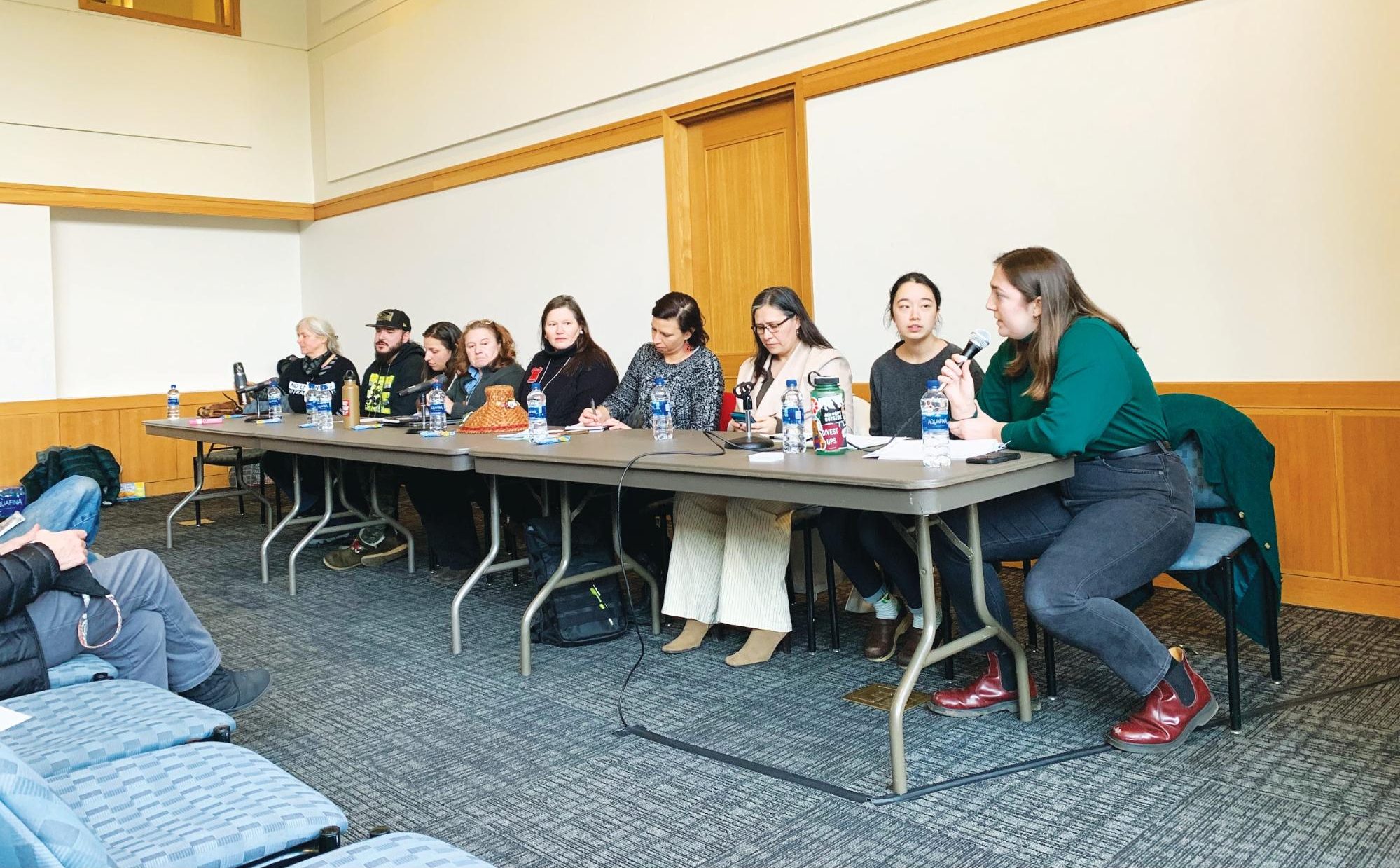
“Stories are more powerful than numbers,” Lisa Grimm, a junior and leader of Eco Club, said. She was talking about the panel titled, “The Human Impacts of LNG: A Panel,” held in Trimble Forum on Feb. 25 involving those who will be directly affected by the liquefied natural gas (LNG) plant to be built in the tide flats of Tacoma. Daily functions and malfunctions at the LNG plant that has been proposed by Puget Sound Energy (PSE) will especially affect the Puyallup people and those at the Northwest Detention Center.
The event was put on by Advocates for Detained Voices (ADV) and ECO club, with moderators Erin Lungwitz and Lisa Grimm. The talk featured seven panelists representing communities affected or threatened by the LNG plant.
Three members of the Puyallup Nation were present: Carolyn Deford, Dakota Case and Patricia Gonzalez. There were members of the Northwest Detention Center Resistance, Maru Mora Villalpando and Megan Ybarra, to discuss the effects on the detention center. Twylia Westling, a board member for Advocates for Cleaner Tacoma, was also present to discuss the scientific side of the issue. Finally, Claudia Riedener, founding member of Redefine Tacoma, was in attendance to share more technical information about LNG and its environmental impacts.
The LNG plant in Tacoma will be pumping natural gas from Canada. “The natural part in it is really just an industry term,” Riedener said.
The so-called “natural” gas is actually fracked. Fracked means that a liquid is injected in order to extract the gas.
“In order to cool it, it would consume up to 15 megawatts of clean Tacoma electricity,” Riedener said.
The gas would then be made pure, which would allow PSE to condense it, which in turn makes it more manageable for storage.
The plant also poses a threat to local salmon populations. Salmon are central to Puyallup life and culture, from stories passed down through generations to providing the nation with food.
According to an Environmental Geology journal article by H. F. L. Williams, D. L. Havens, K. E. Banks and D. J. Wachal, the plant threatens the salmon because the construction can lead to erosion. The erosion can then lead to pollutants being released in the water that negatively affect the salmon. An LNG plant threatens the ecosystem of the salmon and, therefore, the Puyallup people.
“A threat to the salmon is a threat to our way of life,” Case said.
These environmental impacts are, unfortunately, not new to the Puyallup Nation.
“We have stories of zombie fish,” Gonzalez said. These fish have been affected by the chemicals being pumped into the water and they are skeletons except for a little meat on their heads.
“If we were back in the olden days, we would have zombie fish to help us thrive and survive,” Gonzalez said.
The other people the LNG plant will affect are those in the Northwest Detention Center. The detention center is located on the tide flats of Tacoma, extremely close to where the LNG plant is set to be built. When asked if information is being passed between those inside the center and those outside, Villalpando simply said, “No.”
“There’s no fire drills that are happening,” Villalpando said. When a nearby lithium battery recycling plant went up in flames, the people inside the detention center had no idea what was going on. Villalpando expressed concern that if the LNG plant has any safety issues, the people inside will face the same problem. During the burning of the recycling plant, the people inside could feel the effects of the lithium but did not know what was causing them.
“The protocols are built only for workers but not for the people detained,” Villalpando said.
According to the panel, there is no upside for the Puyallup people or those detained in the Northwest Detention Center. Outside air can be felt and smelled by those inside the detention center. This means that the harmful chemicals from an LNG emission plant can get inside too. The Puyallup tribe has already witnessed the effects of harmful chemicals with the salmon, and these effects will continue if the LNG plant is built.
The costs also appear to outweigh the benefits for the people of Tacoma. Since PSE is a private company, they have an incentive to follow profit over public welfare.
Despite the fact PSE is a private company, the public has the ability to control if the LNG plant gets built by going through the city. “Look at the city officials, look at the government. Look at all of them. They think they can do whatever because nobody’s showing up to their offices,” Case said. If the city officials’ constituents are aware and show up, Case believes that can make a huge difference on whether or not the LNG plant gets built.
Although the information given at the talk was ominous, the panelists were quick to offer advice to the students of the University of Puget Sound. “Be hopeful,” Westling said. If Puget Sound students want to help those directly affected, activism must be done on and off campus. “What are you fighting for? What are you trying to protect? What do you love? Never forget that piece,” Westling said. Whenever the fight for a clean, viable and safe future becomes tough, students should look to remember why they started.

